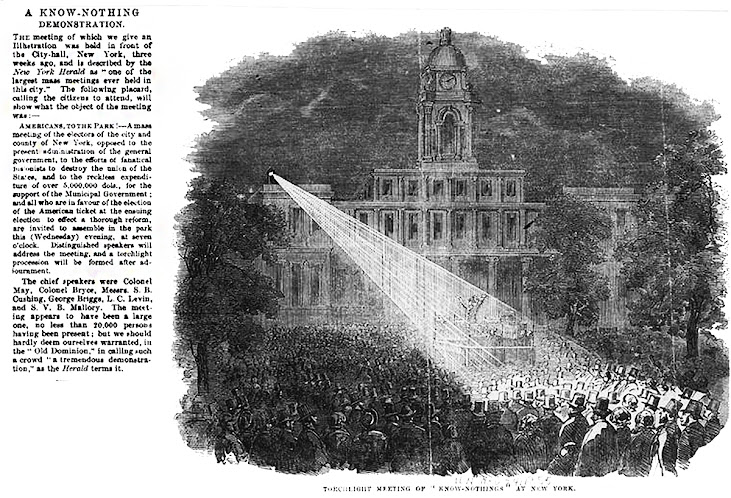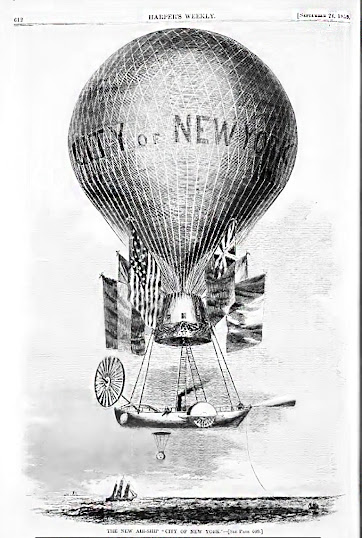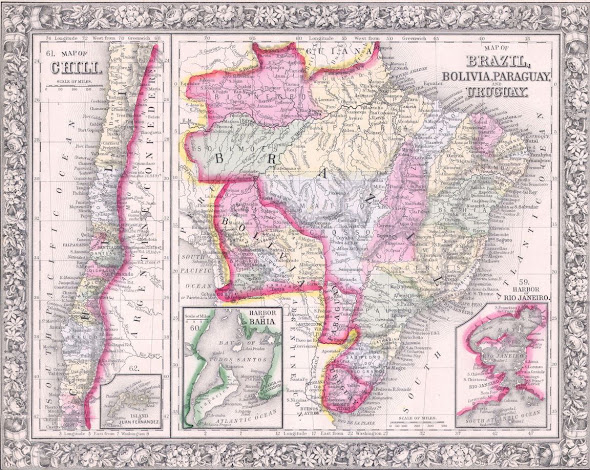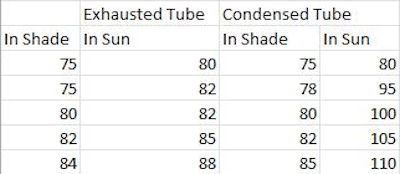Locofocos, Barn Burners, and Putty Heads
Locofocos, Barn Burners, and Putty Heads
Torchlight rally of Know Nothings in NY City
Don't you wish you
could call some politician a "Locofoco?" Or protest
"all those Barnburner Putty Heads?"
Plus Know
Nothings, Hards and Softs, Conscience Whigs,
Free Soilers, Putty Heads and Fusionists just to name a few of
the political parties or factions of political parties. Modern
political terms just lack this sort of colorful speech.
Sept. 25, 1852 NY Herald (On the NY State Democratic convention)
Thus was the State ticket made up of two softs, one barnburner and one hard shell hunker; and having formed an electoral ticket upon which are eighteen hunkers to seventeen barnburners and softs, and a State committee which reckons nine barnburners and softs to seven hunkers, the convention adjourned to sleep off the excitement. The ticket will be elected.
Political parties were nothing like they are today.
While slavery was a major issue in American politics before 1848 it was by no means the dominating dividing issue among Americans. Infrastructure--how much and who should pay for it dominated politics.
It was only after The United States won a vast amount of land from the Mexican War in 1848 that the question of slavery or "free soil" in these new territories began to dominate national politics from 1850 until the Civil War.
As major issues of the
day rose and ebbed there was sure to be a political party for it or against it.
For example, there was an anti-Freemason party composed of people
convinced the Freemasons were murdering children in Satanic rituals. Many won office with the promise to crack down
on secret societies, some of which existed only in their imaginations. Eventually, paranoia about freemasons subsided
and former members of the party drifted off to become Whigs, democracies,
or leaping from one paranoia to another, joining the Know Nothings when massive Irish immigration began.
Know Nothings were sort of like Q-anon crossbred with the modern Republican party, part cult
and part political party. The Know Nothings were
anti-Catholic, anti-Irish, and anti-immigration except for north European
Protestants. They believed the Pope was attempting
to take over the United States. Know Nothings were behind the riots in Washington
DC in 1857 meant to overturn an election. They took their name from the pledge party members made that when questioned about its plans or objectives, they were to answer, "I know nothing."
Alexandria, VA September 24, 1855 exposes Know Nothing hypocrisy
The present day Democratic Party has hazier origins. Before the Civil War they were referred to as “the democracy” or the “the democracies,” always with a lower case “d.” Originally strong in both the North and South, their platform was against spending Federal money on infrastructure, favored suppressing the power of banks, and as little Federal presence in state or local government as possible. Andrew Jackson was considered their hero and ideal for abolishing the requirement for a voter to own property, thus “giving the common man the right to vote,” (a white 21 year old males only) and appointing friends to Federal offices, opening Federal service to the middle and poor classes, an early attempt at diversity training.
Their opponents were the Whigs. Taking their name from a liberal faction of Britain’s House of Commons, the Whigs favored “internal improvements” such as canals, roads, schools, harbor improvements, etc. partly or completely funded by the Federal government and subject to some government control. The Whigs split over slavery as well, but their true demise as a political power came in 1848. Whigs had loudly opposed the war with Mexico. Now viewed as unpatriotic defeatists, Whigs who wanted a political future quickly left the party to find some other allegiance. Among them a young first term Whig congressman from Illinois named Abe Lincoln lost re-election.
The democracy
party split into several powerful factions.
Anti-machine politics
Jacksonian democracy gained the name Locofocos when their
opponents, the Hunkers turned off the gas lights in their building,
leaving them in the dark until the group could find candles and self-lighting
matches called locofocos. The Locofocos were radicals in favor of
labor and more open government as well as being anti-slavery democracy.
The Death of Locofoco-ism
On the far right, the Devil says he will bar the doors of Hell so varmints like Locofocos can't get in
The Hunkers were
so called because they supported the machine politics of the democracy which
would give them soft public service jobs after which they “hankered.”
The Barnburners were even more radical than the Locofocos. They would do anything to abolish slavery, including “burning down the barn just to chase out the rats.” That is, dissolving the whole democracy party. The Locofocos split, some “Soft,” in favor of reconciliation with the Hunkers and preserving the party and some against, the “Hards.”
Soon, the Barnburners were beset by "Putty Heads."
Below, a satire of the Barnburner Hards leaving the democracy party for the 1848 elections
Endorsement by the NY Herald, June 30, 1848
The present Republican Party attempted to unify people across the country at its founding in 1856 with an issue they felt North and South could get behind. Polygamy. Their platform called for “the eradication of the twin barbarisms polygamy and extension of slavery.” In contrast to the Know Nothings, the early Republican platform was vigorously pro free immigration, believing the country needed more industrious farmers and workers to fill up the new territories.
By 1860, “the democracy” was badly split between pro slavery and anti-slavery members. The pro South Democrats in the North, such as New Hampshire native President Franklin Pierce (1852-1856), were known as a ‘doughfaces,” for changeable positions and then, during the Civil War, as ‘Copperheads” for the lapel pin made of a copper penny they wore.
Fayetteville NC 1856
A KNOW NOTHING SECESSIONIST--It is said that the Honorable Kenneth Harper, the great Know Nothing (indecipherable)in North Carolina, is strongly in favor of secession.
The Barnburners' Convention June 22, 1848













Comments
Post a Comment